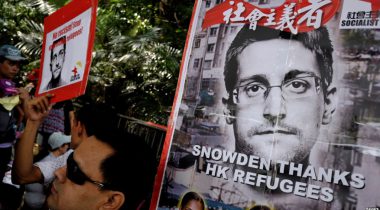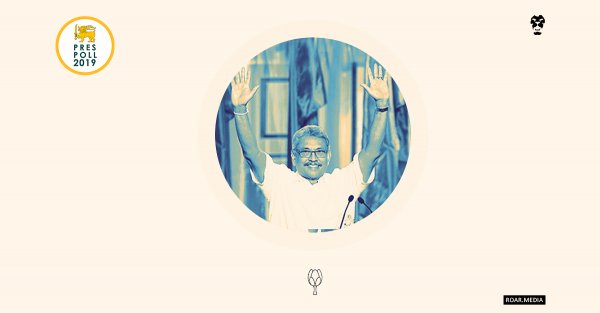
“Hong Kong’s version of untouchables” – the asylum seekers (three Sri Lankans and one Filipino), who “opened doors and hearts” to whistle-blower Edward Snowden, now face the possibility of deportation from Hong Kong to the very countries they fled from.
When Oliver Stone’s movie Snowden premiered at the Toronto International Film Festival in September 2016, it offered viewers a humanised glimpse into the man behind one of the world’s most significant data leaks – while also, inadvertently perhaps, exposing the people who gave him refuge in Hong Kong after the story broke.
It is no longer a secret that those who sheltered Snowden were themselves asylum seekers living in the poorest sections of affluent Hong Kong. Snowden’s lawyer, Robert Tibbo, was confident that the crowded and poverty-stricken slums would be the last place anyone would look – and until the movie forced these asylum seekers into the public eye, not a soul, apart from Snowden, his lawyers, and the asylum seekers themselves, had the faintest idea that the crumbling facades of the towering lower-income housing complexes held such a secret.
 Joseph Gordon-Levitt as Edward Snowden in Oliver Stone’s 2016 movie Snowden. Image courtesy RT.com
Joseph Gordon-Levitt as Edward Snowden in Oliver Stone’s 2016 movie Snowden. Image courtesy RT.com
Since then, the asylum seekers – a Sri Lankan couple (Supun Kellapatha and Nadeeka Nonis) with two children, a Sri Lankan man (Ajith Pushpakumara), and a Filipino woman (Vanessa Rodel) and her child – have attracted much media attention and global curiosity. International media channels buzzed with videos, photos, and articles on the brave asylum seekers, while local Sri Lankan media remained largely silent, mostly content with republishing stories written by international media.
Their open-heartedness, however, seems to have come at a price – the Hong Kong government, according to the legal representatives of the three families, has expedited the deportation process, which Snowden called “irregular, immediate deportation hearings.”
HK Migration says the refugees who aided me must face irregular, immediate deportation hearings this week. Details: https://t.co/3WalvUEb3X
— Edward Snowden (@Snowden) March 22, 2017
At a press conference held in Montreal on March 22, Marc-André Séguin, President of For the Refugees, pointed out that while their clients entered Hong Kong “separately and years apart from one another,” the letters from the Hong Kong authorities about the deportation hearings “all came within a few hours of the March 9 press conference” (where it was announced that the asylum seekers have applied for asylum to Canada).
Séguin further states that it is evident that his clients are “specifically targeted by Hong Kong’s immigration authorities, who are actively trying to get our clients out of its territory and back to their home countries, where they will be apprehended, tortured or killed.”
Robert Tibbo, who represents both Snowden and the asylum seekers who sheltered him, explains that until recently, the Hong Kong government has, for the most part, ignored his clients’ cases, and that the rushed asylum screenings were “on short notice,” and were “extremely brief and incomplete”, and took place while Tibbo was in Europe, unable to represent his clients.
“All the three families’ cases are uncertain and are in limbo,” explains Tibbo, adding that “there is a real risk their cases could be rejected in the next few weeks.”
Dire Straits
For the asylum seekers, it would seem that Oliver Stone’s movie complicated an already complicated life. Fleeing their countries of origin for various reasons including political persecution and torture, their lives have seen much turmoil since coming into the limelight.
Speaking to Roar, Robert Tibbo explained that a third party had disclosed the information to Oliver Stone. “We realised that when the film comes out, the media and the governments of the world will start focusing on me and my clients,” he said.
To mitigate the eventuality that all his clients would be targeted, and to ensure that the world saw them for who they were – as human beings who opened their “doors and hearts” to Snowden, despite having so little – they decided that they had no choice but to go public. “We wanted to ensure that there was a high level of transparency. If there was a lack of transparency, someone could possibly do something bad to my clients,” Tibbo explained.
 Robert Tibbo. Image courtesy La Presse
Robert Tibbo. Image courtesy La Presse
Since coming into public focus, however, the asylum seekers have had to deal with several difficulties, including having to move houses several times – for both safety reasons, and because of the media knocking on their doors day and night. According to Tibbo, however, the process of moving his clients to safety was far from smooth. When Filipino asylum seeker Vanessa Rodel, with whom Snowden stayed briefly, approached the International Social Services (ISS) and explained her predicament to them, the ISS began questioning her about Snowden – and when she refused to comply, they informed her that they would not be paying her electricity bill.
Given that asylum seekers in Hong Kong cannot seek employment and face 22 months imprisonment if caught violating this rule, and given that the monetary assistance afforded to these asylum seekers is meagre to begin with, such threats are significant in making already abject conditions worse.
Vanessa returned to the ISS a week later to insist that she had to move out for the safety of her five-year-old daughter (who is stateless) and herself. She explained that the flat adjacent to hers was occupied by five mainland Chinese prostitutes, and that apart from the media banging on her door, she also had to contend with customers of the prostitutes outside her house. The ISS, however, informed her that if she moved, she would lose her deposit and would not receive one for her next home. They also said that they would be cutting off all assistance. Since November 2016, Vanessa and her daughter have been surviving exclusively on the funds provided by various crowdfunding campaigns – the Hong Kong government has not been providing her any assistance, Tibbo claims.
The plight of the Sri Lankan couple, Supun and Nadeeka, with their two children (one aged five, the other barely a year old, both stateless) is no different from Vanessa’s. After their role in sheltering Snowden was exposed, the Sri Lankan couple, too, were reportedly questioned by the ISS about Snowden, and, because they didn’t comply, their appeals for an increase in state assistance went ignored. Their request to move houses, too, was unheeded.
Since November last year, Supun and Nadeeka’s five-year-old daughter has also been unable to attend to school. The local Chinese school she had been attending kept her out, and was hounding the family for money. Tibbo explains that although the Education Bureau in Hong Kong had agreed to pay the school fees, they had failed to do so.
 The asylum seekers who sheltered Edward Snowden. Image courtesy BBC
The asylum seekers who sheltered Edward Snowden. Image courtesy BBC
Tibbo is certain that his clients are being targetted and persecuted by the Hong Kong government – the living conditions they are subject to amounts to a long-term violation of human rights, violating Article 7 of the International Covenant on Civil and Political Rights (ICCPR), and the unexpected fast track screening of his clients, he asserts, is clearly designed to deport them, amounting to a lack of state protection, and a loss of liberty.
According to an article published by Al Jazeera, “ISS declined to comment on Rodel and Kellapatha’s allegations or their individual cases. Connie Hui, a press relations manager with ISS, told Al Jazeera that, ‘humanitarian assistance will be given in accordance with the current eligibility criteria’, in reference to asylum seekers who come to them.”
Double Jeopardy
If living in penury and limbo, and being the target of the host country’s government wasn’t enough, there are fears among the Sri Lankan asylum-seeking community in Hong Kong that the Sri Lankan Criminal Investigations Department (CID) had been on the ground around November-December 2016, investigating and targeting a number of Sri Lankan refugees, including the Sri Lankan asylum seekers who sheltered Snowden.
“Once we became aware of the activities of the CID in Hong Kong, we had the three families immediately moved from their homes into new safe locations,” Tibbo said, adding that his clients have “a well-founded fear of persecution in Hong Kong by both the Hong Kong and Sri Lankan governments,” and that “there is a lack of state protection by the Hong Kong government.”
 Supun Kellapatha and Nadeeka Nonis with their two children. Image courtesy South China Morning Post
Supun Kellapatha and Nadeeka Nonis with their two children. Image courtesy South China Morning Post
Additionally, in October 2016, the relatives of the asylum seekers, back in Sri Lanka, were reportedly “questioned, harassed, and threatened” by the Sri Lankan government, the CID, and the Sri Lankan military. “The Sri Lankan families in Sri Lanka are distressed by these incidents,” Tibbo states. “They were asked about or threatened to disclose the asylum seekers in Hong Kong, their whereabouts, their contact details, as well as the contacts and details of their friends.”
The Sri Lanka Police has, however, denied all such allegations. Police Spokesperson, DIG Priyantha Jayakody, told Roar that “we categorically deny all such allegations. We have repeatedly emphasised that their lawyer [Tibbo] is spreading baseless allegations against the Sri Lanka Police to get undue support from the Hong Kong government. We deny the involvement of the CID in Hong Kong, and repeat that only one ASP attended an Interpol conference in Hong Kong. He is the only officer who visited Hong Kong on behalf of the Sri Lankan Police on official duty. They are asylum seekers, why should we harass them?”
Jayakody further denied that the Sri Lanka Police has had contact with the asylum seekers’ families in Sri Lanka. “This is completely purposeless, we absolutely deny this. They were not questioned, threatened, or harassed in any way whatsoever,” he said.
Fleeing Torture
Returning to Sri Lanka, however, is not an option for most of the Sri Lankan asylum seekers who sought refuge in Hong Kong. Tibbo reveals that there is a significant community of Sri Lankan asylum seekers in Hong Kong – over 250, in fact – who fled due to persecution back home.
According to Hong Kong government statistics, of the 9,981 non-refoulement claims, as at 31 December 2016, 281 Sri Lankans have pending cases. From a total of 11,138 torture/non-refoulement claims from late 2009 to December 2016, only 72 were substantiated – this included 14 Sri Lankans; incidentally the highest number of substantiated claimants on the list.
Some of them are military deserters, who have witnessed and been subject to torture, a practice which, Tibbo claims, is endemic and systemic in the Sri Lankan military. “My clients know what went on behind closed doors from the 1980s up until 2003,” he said, pointing out that there are also female soldiers who were subjected to various abuses within the military.
 Ajith Pushpakumara. Image courtesy sbs.com
Ajith Pushpakumara. Image courtesy sbs.com
Another segment of Sri Lankan asylum seekers fled due to political persecution, particularly during the Rajapaksa regime. “They were all targetted, their lives threatened and subjected to cruel, inhuman, degrading treatment, and they were punished and tortured,” Tibbo notes. Most of these asylum seekers have faced persecution for their political opinions or activities.
There are also several cases of gender-related persecution – both male and female. Some of Tibbo’s Sri Lankan clients, he explains, have been subjected to sexual harassment, sexual abuse and, in extreme cases, rape. In some instances, sexual harassment and abuse occurred within the military itself, Tibbo states, and in others, was used as a political tool. “Most of my clients didn’t dare go to the hospital for fear of being stigmatised, and they were too afraid to approach the police.” This includes a few of Tibbo’s male clients who, too, had been raped, but feared that if they reported the rape, it may be considered a homosexual act – which is illegal in Sri Lanka – and be punished for it.
Where Hong Kong is concerned, however, the reality is that until most refugees land there, they don’t realise that Hong Kong has a practically negligible acceptance rate of refugees – around 0.7%, according to some reports. According to Tibbo, the agents handling illegal migration often deceive them. “No one knows there’s practically no support, that they cannot work and that they will be discriminated against until they get there. They really thought that they would have safety and security. They didn’t know they would be treated as criminals. The laws and practices in Hong Kong are such that asylum seekers are destitute and left in desperate circumstances,” he explains.
Refugee Blues
There are no rose-tinted glasses in existence that will make the plight of asylum seekers and refugees – not only in Hong Kong, but the world over – seem less marked by struggle and loss. A lot of the coverage on refugees highlights their struggles with poverty and deprivation, but an unaddressed problem which many refugees face is depression and PTSD. Although some Western countries provide asylum seekers with counselling services, this does not take place across the board.
Refugees in Hong Kong are likened to untouchables, their lives confined to shadows and slum cities. Most have little to eat, live in unhygienic houses, and wear old, worn out clothes; they cannot work, they have limited money for transport, and are given food coupons restricting them to one or two supermarkets. Over time, Tibbo explains, many become depressed and give up hope. Their psychological integrity is compromised when they realise that they don’t have enough money for diapers or milk powder for their children. Some resort to selling their food coupons to be able to make enough money to cover rent and electricity. “They would rather work for a pittance than steal something. They feel that working illegally is not dishonest. They haven’t cheated anybody, they haven’t hurt anybody, and so some of them embark on risk behaviour out of desperation, knowing that they stand a chance of being caught and jailed.”
 The asylum seekers who sheltered Edward Snowden with their children. Image courtesy fortherefugees.com
The asylum seekers who sheltered Edward Snowden with their children. Image courtesy fortherefugees.com
Discrimination is common – and in some cases, as Vanessa’s, and Supun and Nadeeka’s children have discovered, it is based on skin colour, and has dogged their steps in school. Tibbo explained that, among their teachers and other children, the girls have been treated as inferior based on their skin colour, with their peers refusing to play with them.
“Quite often, the only support structure asylum seekers have are their solicitors, barristers, and the asylum seeking community itself,” Tibbo said, adding that public hospitals are more treatment-based and do not often provide counselling services. Where there have been psychological examinations, they are often short, said Tibbo, with the doctor merely confirming that the patient is fit to be interviewed for the refugee screening process, as opposed to being given counselling and support.
In Limbo
 Edward Snowden. Image courtesy: wired.com
Edward Snowden. Image courtesy: wired.com
Currently, the families who sheltered Snowden are awaiting a verdict from Canada, where they applied to for asylum. Their fate hangs in the balance. The Hong Kong government is yet to pronounce their verdict following the screening process which took place towards the end of March, and there is a very real chance that these families may be deported to the their countries of origin.
For Supun, Nadeeka, and Ajith, this means returning to the country they fled from under desperate circumstances – a country which may or may not welcome them back. In February, Prime Minister Ranil Wickremesinghe proclaimed “come back, all is forgiven,” urging Sri Lankan refugees (who had fled illegally to Australia) back to the country during an official visit to Canberra. However, Lakshan Dias, a well-known human rights lawyer and activist, believes that Sri Lanka is not “conducive for refugees to return,” and will not be until reconciliation and transitional justice mechanisms are put in place.
He explains that there is no guarantee that the returning refugees may not be harassed and detained by the law enforcement. “It depends entirely on your case. If you come back to Sri Lanka with links to the LTTE, then you definitely will be screened by the State Intelligence Service, then the Criminal Investigations Department and the Terrorism Investigation Division, and they can detain you if necessary. In this case, they sheltered Snowden, and, therefore, due to pressure from foreign governments, harassment is entirely possible. We don’t know for certain how much protection the Government will give them,” Dias told Roar.
Receiving little or no assistance from the Hong Kong government, these families are now being sustained through various crowdfunding campaigns. A gofundme page has been set up, while Joseph Gordon-Levitt recently released a video talking about the plight of Edward Snowden’s ‘guardian angels’.
At the time of publication of this article, the Government of Sri Lanka had yet to provide an official statement.
Cover image courtesy: VOA news





